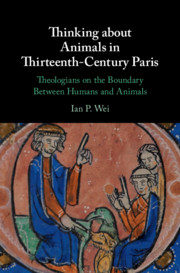 Thinking about Animals in Thirteenth-Century Paris
Thinking about Animals in Thirteenth-Century Paris 1 - William of Auvergne
Published online by Cambridge University Press: 07 August 2020
Summary
Chapter 1 demonstrates that in his De legibus William of Auvergne emphasised the differences between animals and humans, regarding them chiefly as tools. God used them to shape human behaviour, both by demanding sacrifice and by granting them symbolic meaning. Demons used them in natural magic. Humans used them as valuable and sometimes necessary property in pursuit of survival, and to ensure proper relations with God. In the De universo, however, William noted significant similarities between animals and humans. Some animals knew and thought in very similar ways to humans. The power of their wills was similar to that of humans. These similarities were most likely to receive attention when William discussed providence or when he analysed animals in order to work out the nature of higher beings on the grounds that if something of lower standing in the hierarchy of being had a power or quality, beings higher up must also possess that same power or quality, though to a greater degree and perhaps with other powers in addition. This last approach meant that William treated animals as a profoundly valuable learning resource, one predicated on the existence of meaningful similarities across the boundaries that structured the hierarchy.
Keywords
- Type
- Chapter
- Information
- Thinking about Animals in Thirteenth-Century ParisTheologians on the Boundary Between Humans and Animals, pp. 9 - 94Publisher: Cambridge University PressPrint publication year: 2020


